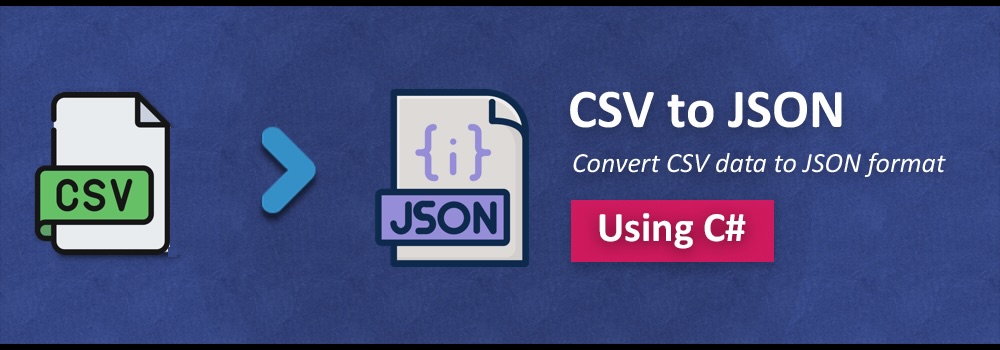The CSV (Comma-Separated Values) format is widely used for storing and sharing structured tabular data. However, for modern web applications, APIs, and software systems, JSON (JavaScript Object Notation) has become the preferred choice due to its lightweight, hierarchical, and language-independent nature.
In this article, we’ll explore how to perform CSV to JSON conversion in C# .NET using the .NET Cloud SDK. You’ll also learn how to integrate cloud-based data conversion into your applications effortlessly.
- Why Convert CSV to JSON in .NET?
- CSV and Excel Conversion API
- Export CSV to JSON in C#
- Convert CSV to JSON using cURL Command
- Online Free CSV to JSON Converter
Why Convert CSV to JSON in .NET?
We know that CSV files are ideal for flat tabular data, but when dealing with nested or structured datasets, JSON is far more flexible. So, JSON allows data to be easily parsed, shared, and utilized in APIs and modern web services. Therefore, automating the CSV to JSON conversion in your .NET apps ensures faster data transformation and easier integration with other systems.
CSV and Excel Conversion API
In order to manipulate and transform Excel and CSV file formats in the cloud, Aspose.Cells Cloud SDK for .NET is an amazing solution. This platform independent SDK offers the capabilities to create and manipulate Excel as well as CSV formats within .NET applications. This API is so powerful that it maintains the fidelity of the resultant JSON file and performs CSV to JSON quickly, accurately, and without the need for any local software installation.
To begin, install the SDK from NuGet using the following command:
Install-Package Aspose.Cells-Cloud
Next, register for a free Aspose Cloud account at the Aspose.Cloud Dashboard to get your Client ID and Client Secret for authentication.
Export CSV to JSON in C#
Here’s a simple example that demonstrates how to convert a CSV file to JSON using C# .NET code snippet.
Step 1: Initialize the API
var clientId = "YOUR_CLIENT_ID";
var clientSecret = "YOUR_CLIENT_SECRET";
var cellsApi = new CellsApi(clientId, clientSecret);
Step 2: Upload CSV File to Cloud Storage
var fileName = "sample.csv";
using (var fileStream = System.IO.File.OpenRead(fileName))
{
var uploadResponse = cellsApi.UploadFile("input/" + fileName, fileStream);
}
Step 3: Convert CSV to JSON Format
var saveOptions = new SaveOptions { SaveFormat = "JSON" };
var request = new PostWorkbookSaveAsRequest(
name: "sample.csv",
newfilename: "output/result.json",
saveOptions: saveOptions,
isAutoFitRows: true,
isAutoFitColumns: true
);
var response = cellsApi.PostWorkbookSaveAs(request);

A preview of CSV to JSON conversion result using .NET Cloud SDK.
Convert CSV to JSON using cURL Command
Alternatively, if you are interested in performing CSV to JSON conversion through command line terminal or in batch processing, you can easily access the CSV to JSON conversion API using cURL command.
Step 1: Get Access Token:
The first step in this approach is to generate JWT access token based on client credentials.
curl -v "https://api.aspose.cloud/connect/token" \
-X POST \
-d "grant_type=client_credentials&client_id=YOUR_CLIENT_ID&client_secret=YOUR_CLIENT_SECRET" \
-H "Content-Type: application/x-www-form-urlencoded" \
-H "Accept: application/json"
Step 2: Execute CSV to JSON Conversion:
curl -v "https://api.aspose.cloud/v3.0/cells/{sourceFile}/SaveAs?newfilename={resultantFile}&isAutoFitRows=true&isAutoFitColumns=true&checkExcelRestriction=false" \
-X POST \
-H "accept: application/json" \
-H "authorization: Bearer {ACCESS_TOKEN}" \
-H "Content-Type: application/json" \
-d "{ \"SaveFormat\": \"JSON\", \"ClearData\": true, \"CreateDirectory\": true, \"EnableHTTPCompression\": true, \"RefreshChartCache\": true, \"SortNames\": true, \"ValidateMergedAreas\": true}"
Try Free Online CSV to JSON Converter
If you’d like to see the conversion in action without writing code, try our free CSV to JSON Online Converter powered by Aspose.Cells Cloud.

Free online CSV to JSON converter app powered by Aspose.Cells Cloud.
Useful Resources
Frequently Asked Questions (FAQs)
Q1: How can I convert multiple CSV files to JSON at once?
You can use a simple loop in C# to iterate over multiple CSV files and send batch conversion requests to Aspose.Cells Cloud API.
Q2: What happens if my CSV file contains special characters or different encodings?
Our .NET REST API automatically detects and handles common encodings like UTF-8 and UTF-16. You can also specify encoding explicitly through LoadOptions.
Q3: Can I automate the conversion process on a schedule?
Yes. You can integrate the conversion logic into background services, Azure Functions, or Windows schedulers for automated execution.
Q4: How fast is the CSV to JSON conversion ?
Conversion speed depends on file size and network latency, but typically completes in a few seconds for standard files.
Conclusion
Converting CSV to JSON format enables seamless data exchange between systems and services. With Aspose.Cells Cloud, you can easily automate this process using just a few lines of C# code. Whether for data migration, reporting, or system integration, the Cloud API ensures reliable and scalable file conversions.
Simplify your workflows, automate data transformation, and let your .NET apps handle CSV to JSON conversion with ease.
